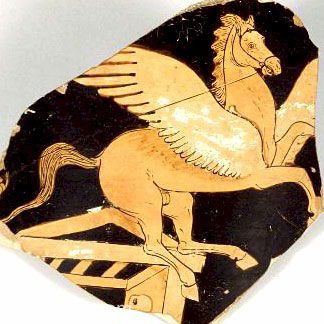PEIRENE
Greek Name
Πειρηνη
Transliteration
Peirênê
Latin Spelling
Peirene
Translation
Tied, Fastened? (peirainô)

PEIRENE was the Naiad-nymph of a fountain in the city of Korinthos (Corinth), southern Greece. She was a daughter of the Sikyonian river-god Asopos who was abducted to the site of the town by the god Poseidon. Their, sons Lekhes (Leches) and Kenkhrias (Cenchrias), were the eponymous founders of the city's twin ports--one on each side of the Isthmos.
Peirene's name was derived from the Greek word peirainô meaning "to tie" or "fasten." This might have referred to the important portage-road linking the two ports or was perhaps connected with the story of Bellerophon who yoked the winged-horse Pegasos beside her spring.
PARENTS
[1.1] ASOPOS (Bacchylides Frag 9)
[1.2] ASOPOS & METOPE (Diodorus Siculus 4.72.1-5)
[2.1] AKHELOIOS (Pausanias 2.2.2)
[3.1] OIBALOS (Pausanias 2.2.2)
OFFSPRING
LEKHES, KENKHRIAS (by Poseidon) (Pausanias 2.2.2)
ENCYCLOPEDIA
PEIRENE (Peirênê), a daughter of Achelous, Oebalus or Asopus and Methone, became by Poseidon the mother of Leches and Cenchrias (Paus. ii. 2. § 3; Diod. iv. 74). She was regarded as the nymph of the well Peirene near Corinth. which was believed by some to have arisen out of the tears which she shed in her grief at the death of her son Cenchrias. (Paus. ii. 3. § 5.)
Source: Dictionary of Greek and Roman Biography and Mythology.
CLASSICAL LITERATURE QUOTES
Pindar, Olympian Ode 13 ep3 (trans. Conway) (Greek lyric C5th B.C.) :
"That grandsire [Bellerophon] who once strove in vain beside Peirene's spring [in Korinthos (Corinth)], and suffered much, seeking to yoke the snake-head Gorgon's offspring, Pegasos (Pegasus)."
Bacchylides, Fragment 9 (trans. Campbell, Vol. Greek Lyric IV) (C5th B.C.) :
"The bright-belted daughters [of Asopos] whom gods settled with happy fortunes as founders of invoilate cities. Who does not know of . . . Peirene the maiden of the twining garland."
Pausanias, Description of Greece 2. 2. 2 (trans. Jones) (Greek travelogue C2nd A.D.) :
"Lekhes (Leches) and Kenkhrias (Cenchrias) [of Korinthos (Corinth)], said to be children of Poseidon and Peirene the daughter of Akheloios (Achelous), though in the poem called The Great Eoiai Peirene is said to be a daughter of Oibalos (Oebalus)." [N.B. Lekhes and Kenkhrias gave their names to the city's twin harbours.]
Pausanias, Description of Greece 2. 3. 3 :
"[In Korinthos (Corinth)] is the entrance to the water of Peirene. The legend about Peirene is that she was a woman who became a spring because of the tears shed in lamentation for her son Kenkhrias (Cenchrias), who was unintentionally killed by Artemis. The spring is ornamented with white marble, and there have been made chambers like caves, out of which the water flows into an open-air well. It is pleasant to drink."
Pausanias, Description of Greece 2. 5. 1 :
"The spring, which is behind the temple [of Aphrodite on the Akrokorinthos (Acrocorinth)], they say was the gift of Asopos to Sisyphos (Sisyphus) . . . I have heard people say that this spring and Peirene are the same, the water in the city flowing hence underground."
Diodorus Siculus, Library of History 4. 72. 1 (trans. Oldfather) (Greek historian C1st B.C.) :
"Asopos made his home in Phlios (Phlius) [the region of Sikyon], where he married Metope, the daughter of Ladon, to whom were born two sons, Pelasgos and Ismenos, and twelve daughters, Korkyra and Salamis, also Aigina, Peirene, and Kleone, then Thebe, Tanagra, Thespeia, and Asopis, also Sinope, and finally Ornia and Khalkis."
SOURCES
GREEK
- Pindar, Odes - Greek Lyric C5th B.C.
- Greek Lyric IV Bacchylides, Fragments - Greek Lyric C5th B.C.
- Diodorus Siculus, The Library of History - Greek History C1st B.C.
- Pausanias, Description of Greece - Greek Travelogue C2nd A.D.
BIBLIOGRAPHY
A complete bibliography of the translations quoted on this page.